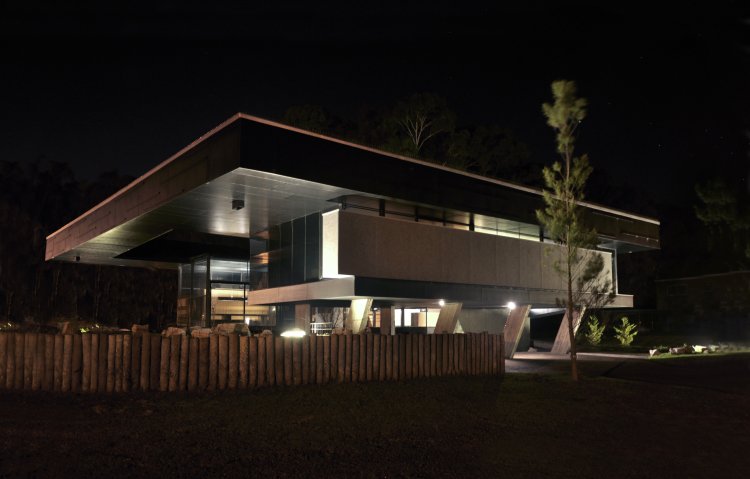House 60
General information: Project: Casa 60 Architecture Office: TAM – Guillermo Elgart Web: instagram.com/tam.arquitectura E-mail: tallerarquitecturamardelplata@gmail.com / juanmalbarenque@gmail.com Office country: Argentina Premios: Completion year: 2018 Building area: 222.58 m² Project Location: Mar del Plata, Buenos Aires. Media: Photography Credits: Obra Linda (Cecilia Ines Pallin López, Pedro Ferrando) Photography Credits: Manuela F. Pozzobon Photographer web: www.obralinda.com Photographer contact: pedro@obralinda.com Video credits: Obra Linda (Cecilia Ines Pallin López, Pedro Ferrando) Link: https://www.youtube.com/watch?v=Wm3MG39Ozj8 Office: Architects: Guillermo Elgart, Silvia Tammone. Design Team: Juan Albarenque, Andrés López. Client: Rodrigo Lucero Engineer: Felipe Otarola Colaboration: Juan Icarde.

MEMORY
A suspended horizontal surface and the ground trap the space where life develops. The outside, the inside. The stillness, the movement. The void, the all.
By folding both surfaces, they modify their horizontal and discover different heights between them.
The void was there and it was subtly trapped for a family to develop their life.
CONTEXT
-CLIENT
A family that decides to live in the security of a private neighborhood, one of many that emerge in the big cities of Argentina.
-The PROGRAM
Living room that allows different ways of living.
Dining room, almost barbecue area, that when you want you can divide it from the living room. A Kitchen that is directly connected to the dining room but also independently connected to the living room, being able to serve both sectors independently.
A master bedroom, and another with its own bathroom.
Desk area, gym, games area that can be divided and transformed into a third bedroom.
-ENVIRONMENT
Far from the center of Mar del Plata, on the way to Miramar is the private neighborhood “Las Prunas”. It is a small neighborhood with a beautiful eucalyptus forest in its center and the Argentinian pampean plains around it.
-The LOT
The outline of the neighborhood is made-up of elongated blocks, so the end of each block is taken only by two small lots. One of these lots, of 26 x 29 meters with a very pronounced chamfer, is where the property is built. Towards the center of the block the eucalyptus trees and on the other side the plain and the sunset.
DEVELOPMENT
-MATERIALS
The richest matter is the green area. The goal is to catch it. The large horizontal surface captures the exterior, the views, the small square, the street, the vegetation, making it all its own. The plane extends and surrounds the exterior, and its reflective quality brings nature inside the house. The transparency of the facades allows visual appropriation. At night, the interior lights are reflected, duplicated, multiplied and merge with the exterior lights.
The shelter of a large roof (interior-exterior), the warm and protected interior, and the gaze that is deposited far beyond the limits of the house. Strategies that multiply existing matter making it your own.
-SCHEME
To dominate the public space without it invading the privacy of the home. Through the use of the existing level difference in the lot (1 meter above the street) and the use of a green fence, we were able to give privacy to the garden of the house.
With the resources mentioned above, the house, which is a “U”, lies on the southern limit and frees up the largest portion of land to the north.
The topology of the parts that make up the house strictly follows the functional logic.
- Services on the south party wall.
- Living spaces to the north and directly related to the expansion sector.
- The circulations on the limits to the south.
- The house is wrapped protecting it from the weather and achieving privacy.
-INVESTIGATION
The floor surface, the suspended ceiling plan and thus the generation of a space that moves freely within it. To stay, to move. Inside, outside.
The line that defines the interior and exterior is a line of glass that moves freely under the suspended surface. The circulation connects spaces under it.
People approach their life, their well-being and practice their social rituals under it. Investigating the multiplicity of spatial situations was the premise of this work.
Research is the premise.
The beginning of this work is to link with nature and respect it. Creating a space that is yours, protected, intimate and deprived of the visual continuity of private neighborhoods. A central space, which is almost interior
The house is built in half levels linked by a system of ramps, which stars outside and then continues inside.
The first section follows the natural land and reaches the point of entry or decision. To stay in the living room, or leaning on the wall to go to the service area, or keep going through the ramp that leads to the bedroom area.
The ramp that left us at the second half level wraps around and continues to a place to play games, to study or to do gym.
The circulations are always supported by the relationship with the services. From the upper level there is a double direct communication with both the bedrooms and the kitchen-dining room. Walking through the different levels or with a ladder that resolves the other wing of the "L".
But, the most sought after relationship is the spatial one. The omnipresent cover links all the spaces and orders them. Everyone is under it, EVERYONE. The spaces to stay and those to circulate. The ramps moves under it and leave us in the different places that look at each other and feel the tension of the upper surface and the lines of communication. The gaze travels through different levels, always towards the green heart that gives meaning to the typology adopted.
